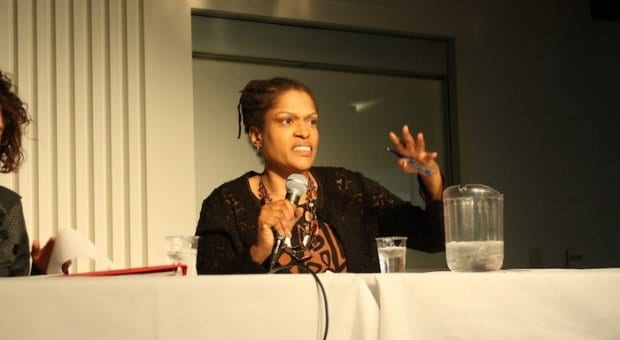Should people go to jail for having sex without disclosing that they’re HIV-positive? Should failure to disclose be classified as sexual assault? These were among the questions up for discussion at a Canadian HIV/AIDS Legal Network panel discussion in Toronto on April 24.
In 2012, the Supreme Court ruled that a person is off the hook for not disclosing only if they use a condom and have a low viral load — and the sex is vaginal. Otherwise, they can be charged with aggravated sexual assault. It’s unclear whether the same rules apply to anal sex.
Opponents of criminalization, including the Legal Network, have argued that the law is grounded in AIDS panic, ignores scientific evidence on the real risks of transmission, and perpetuates the stigmatization of people living with HIV.
The panel discussion focused specifically on the impact of criminalization on women living with HIV, and though the panellists generally agreed that the law is a blunt instrument for addressing this complex social issue and that criminalization contributes to stigmatization of people living with HIV, the question of criminalization has been broadly divisive.
Joanna Birenbaum, a litigator specializing in human rights and sexual assault law, described the heated debates that took place among feminists in the Women’s Legal Education and Action Fund (LEAF) when she was the organization’s’ legal director.
“The members of the expert legal committee in this organization called LEAF . . . they were really, really conflicted,” Birenbaum said. Some committee members pointed to the severe consequences of criminalization on an already stigmatized minority and the disproportionate impact on people of colour and low-income populations.
Others, however, strongly felt that sex without disclosure had to be covered by sexual assault laws, arguing that without disclosure of HIV status, true consent has not been given.
In general, however, committee members agreed that the routine prosecution of nondisclosure as aggravated sexual assault, the most serious charge within this category of offences, is wrong.
Though Birenbaum avoided declaring her own stance, her remarks proved most controversial with audience members, with some taking exception to the notion that decriminalizing nondisclosure could weaken conceptions of sex assault and questioning whether feminism could in any way be reconciled with criminalization.
“It’s not just feminists who are divided. Women living with HIV are very divided on criminalization,” said Beri Hull, global advocacy officer for the International Community of Women Living with HIV and AIDS (ICW). As an organization, however, ICW takes a hard line against criminalization of exposure, transmission and nondisclosure. “ICW as a network see that HIV criminalization is a violation of our rights. It’s our right to non-discrimination, our right to due process, and our right to health,” Hull said.
Furthermore, she argued it’s unlikely to be an effective deterrent, since paradoxically, sharing your HIV status makes you vulnerable to possible accusations of nondisclosure. Meanwhile, people who don’t get tested are exempt from prosecution for nondisclosure.
Saara Greene, associate professor at the McMaster University School of Social Work, focused on the broader issue of “informal criminalization,” wherein women with HIV are treated as criminals regardless of whether laws have been broken. Women might be vulnerable to spiteful accusations of nondisclosure from former lovers and feel that to have any sex is legally risky. HIV-positive mothers live under threat of losing their children because child protection workers could potentially regard even basic physical interactions as risky.
In his closing remarks, Richard Elliott, the HIV/AIDS Legal Network’s executive director, noted that Canada has among the highest rates of prosecution for HIV nondisclosure, second only to the United States in absolute numbers, and is among the top countries in per capita prosecutions.

 Why you can trust Xtra
Why you can trust Xtra


